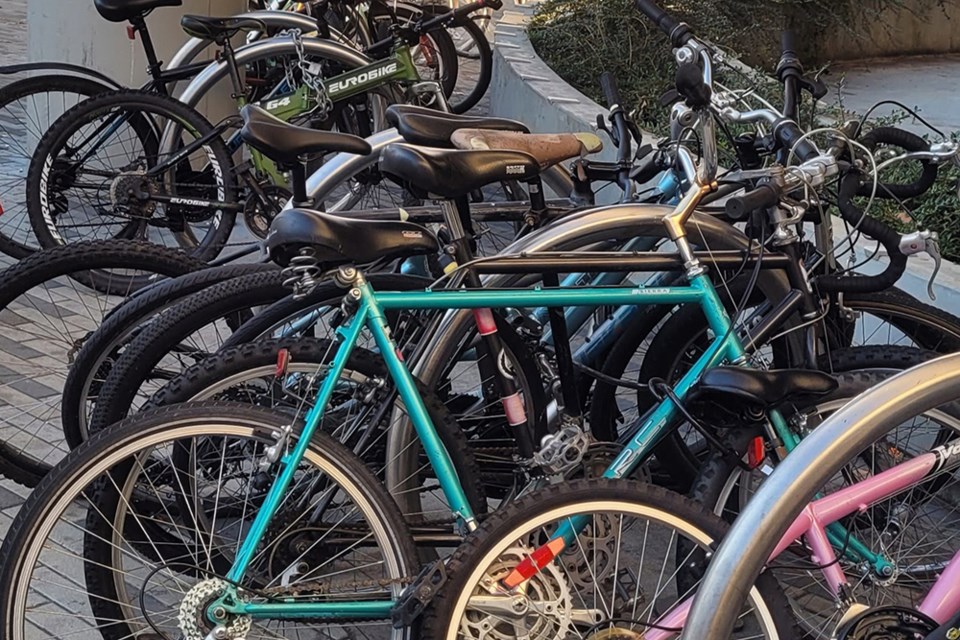Switching just two weekly trips to multi-modal, such as bike and bus or bike and SeaBus, helps reduce greenhouse gas emissions and traffic congestion.
So why not ride your bike down to Lonsdale Quay, park it and then take the SeaBus downtown? On the way home, rack your bike on the bus and glide back up the hill, or give yourself a free workout riding up Capilano Road, Grand Boulevard or Mountain Highway. Why not, indeed?
Multi-modal travel is an excellent way to get around many Metro Vancouver cities. But here on the North Shore, some low-bar hurdles remain. The fundamental ingredient to making bike-to-transit work is secure bike parking. When you get to your transit stop, if there’s nowhere to lock up your bike safely, you will not try multi-modes. It’s a bummer because, especially with e-bikes, this is an opportunity waiting to happen.
Connecting bikes and buses encourages people to enjoy transit from farther away, without using a car to get to a park and ride. Studies show that transit users are willing to bike more than ten times the distance they’ll walk to transit. Yes, I will e-bike 20 blocks to the SeaBus, but no, I won’t walk that far. Walking is fantastic, but it simply takes too long.
Let’s say I ride my bike to the SeaBus to commute downtown. Currently, there are 14 outdoor bike racks and a sprinkle of bike lockers available. I would not leave my e-bike on the standard outdoor racks while I went to work. But they are being used. I might use a bike locker if one is available.
Bike lockers are great, costing only $1/day and fully protecting your bike from theft and the elements. But they are big and require lots of space just for one bike. Right now there are 14 lockers at the Quay as part of a pilot project. Half are for subscribers, while half are on-demand, first come, first served. Also in the mix are “Bikeep” stations, which are more robust, locking bike racks where you could leave your e-bike. The rack locks your front wheel and the frame to the station. There are eight of these at Lonsdale Quay, and all were unused when I took a look. Most people probably don’t know about them or think they will cost something. They are free to use if you have the app.
I keep thinking there won’t be enough bike lockers and Bikeeps to look after all the people biking to that exchange. We need to get serious about bike parking and put in parkades that can handle many bikes in a small footprint, not just a few. In Metro Vancouver, there are secure bike parkades at major transit hubs in Burnaby, Vancouver, Coquitlam, Surrey, Richmond, and Pitt Meadows.
There are some downsides to the TransLink parkades. While only people registered for access can get in, they could steal your bike if you have an easy-to-cut lock. Also, if you leave anything quickly detachable, someone can steal it. Your bike light is the classic target, but saddles, panniers and wheels have been known to disappear. There are ways to make parkades more secure using a robotic or human concierge service. Robotic garages take your bike at the entrance, store it and return it when you scan in and out. Humans can do the same thing, it’s just a cost difference in capital vs. operating.
Even with CCTV monitoring, there’s no way to ensure that part or your whole bike won’t walk away. The lockers are a better bet for security, it’s just they take up a lot of space. It sounds unbelievable, but the new $30-million Phibbs Exchange project does not include a large, secure bike parkade. There are provisions for seven bike lockers (enough to fit 14 bikes) and outdoor bike racks, but not a garage like the ones at Skytrain stations. What? $30M, and there’s no bike parkade?
For bike-to-transit to help reduce congestion, the North Shore needs far more extensive, free or near free, secure bike parking at Lonsdale Quay, Maplewood, Parkgate, Lynn Valley Town Center, Park Royal, Caulfeild, Horseshoe Bay and Phibbs Exchange.
Why not make it easier to incorporate cycling into travel on the North Shore, where traffic snarls our streets, pollutes our air and makes us all crazy?
Heather Drugge is a sustainable transportation advocate who has used her bike for transportation for more than 20 years. She’s got an e-bike now, and maybe a jetpack next. [email protected]



